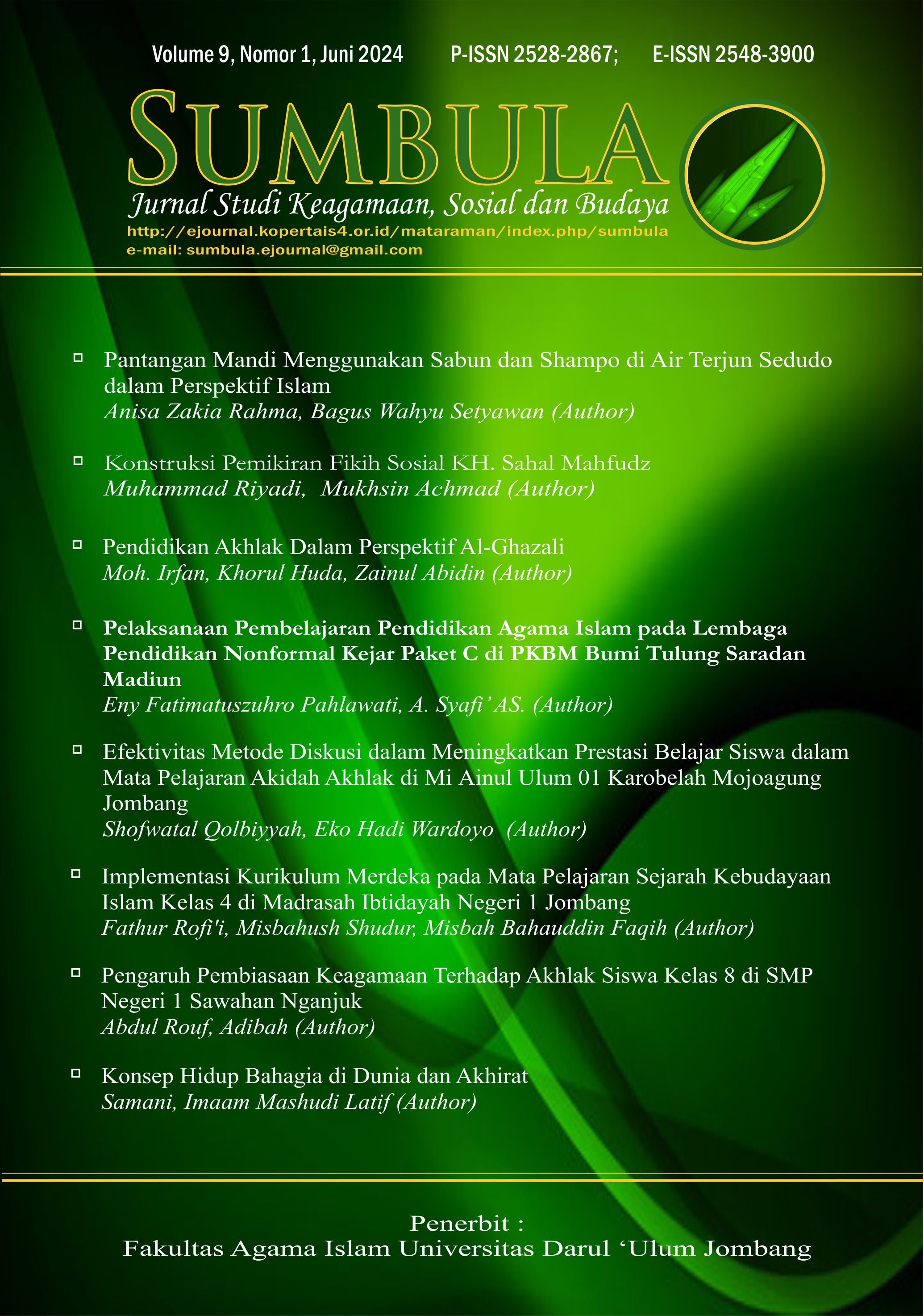Konsep Hidup Bahagia di Dunia dan Akhirat
Abstract
This article focuses on a happy life according to the Qur'an. Happiness is described using the term sa'ada. Explaining several concepts of happiness that are also quoted from several scholars and scientists, as well as Muslim and non-Muslim practitioners as a comparison.
This research is a type of library research, book survey or documentary research. The process of collecting data from various literatures, both in libraries and other places, such as other written document materials, such as magazines, newspapers and others. Data analysis uses Content Analysis which is directed at exploring documents or texts that are widely published regarding the theme of the research.
The results of the study indicate that there is a common misunderstanding that happiness is described as material excess, abundant wealth, luxury, reward and heaven. The concept of happiness according to Islam can be obtained in the world and also in the hereafter. The Qur'an distinguishes between pleasure and happiness. Happiness (al-sa'a>dah, al-falah) is not only about fulfilling desires or lusts, but also two important aspects in ourselves, namely affective (emotional) and cognitive (logical). This is also different from pleasure (pleasure, al-farh, al-surru>r).
Keywords: Life, Happiness, World, Hereafter
References
Abdu ‘Adim, Dhaqiy al-Din. (2012) Mukhtasar Sahih Muslim, terj. Pipih Imran, Insan Kamil, Solo.
Abu Thalhah, Ali. (2012) Tafsir Ibn ‘Abbas (al-Musamma S}ahi>fah ‘Ali> bin Abu> T}alhah ‘an Ibn ‘Abba>s fi> Tafsi>r al-Qur’a>n al-Kari>m), terj. Muhyidin, Pustaka Azzam, Jakarta.
Alawi al-Maliki, Muh}ammad (2010) al-Manhal al-Lat}i>f fi Us}u>l al-Hadith al-Shari>f, terj. Adnan Qahar, Pustaka Pelajar, Yogjakarta.
Ali Salim, Abdu al-‘Athi’, (2009) H}ala>wat al-Ima>n, al-Baya>n, Solo.
Al-Jawjiah, Ibnu al-Qayyim. (2012) Mifta>h al-Da>r al-Sa’a>dah (kunci kebahagiaan), terj.Abdu al-Hayy al-Katani>, Akbar media Eka Sarana, Jakarta.
Al-Misriah, al Hai’ah. Mu’jam al-Fa>d} al-Qur’a>n al-Kari>m (1970). Mesir: Majmu>’ al-Lughah al-‘Arabiyah.
Al-Muqaddas al-Hasany. (2012) Fath al-Rah}man li T}a>libi a>ya>t al-Qur’a>n, Da>r al-Kutu>b al-‘Ilmi>ah, Beirut Libanon.
Al-Wadi’i, Muqbil. Sah}i>h . (2010) al-Musnad min Asba>b al-Nuzu>l, terj. Imanuddin Kamil, Pustaka al-Sunnah, Jakarta.
Colline, Diane. (2010) Lima Puluh Filosof Dunia yang Menggerakkan,: Raja Grafindo Persada, Jakarta.
Departemen Agama RI, al-Qur’an dan Terjemahnya(Jakarta: Nala Dana, 2007)
Hamesma, Harry. (1992) Tokoh-tokoh Filsafat Barat Modern, Gramedia Pustaka Utama, Jakarta.
Ja>bir, Abu> Bakar Ja>bir al-Ja>za>iri. (2010) Aysar al-Tafa>si>r, terj. Ahzami Sami’un Jazuli, Da>rus Sunnah Press, Jakarta.
Khaldun, Ibn. Muqaddimah Ibn. Khaldun. (2011) terj. Ah}madi Thoha. Pustaka Firdaus, cet. IX, 2011, Jakarta.
Majid, Burhan.(2008) 30 Jalan Menuju kebahagiaan , Citra Risalah, Jakarta.
Majmu>’ al-Lugha>h al-‘Arabiyah. Mu’jam Al-Fa>dh al-Qur’a>n al-Kari>m, (1970) Hay’ah al-Mis}}}riyah al-‘A>mmah li Ta’li>f wa al-Nashir, Mesir.
Muhammad al-Qasim, Abdu al-Muhsin (2013) Khut}uwa>t ila Sa’a>dah, terj. Sufyan al-Atsari, Da>ral al-Naba’ Surakarta.
Schwarttz, David J.The Magic of Thinking Success (1996) terj. Anton Adiwiyono, Bina Rupa Aksara, Jakarta
Segal, Yulia. (2006) Pengantar Umum Psikoanalisis Sigmund Freud, Pustaka Pelajar, Jakarta.
Seligman, Martin. Menciptakan Kebahagiaan dengan Psikologi Positif. (2010) terj. Ah}madie, Mizan Pustaka, Jakarta.
Surbakti, EB. Gangguan Kebahagiaan Anda dan Solusinya (2010): Elex Media Komputindo, Jakarta.
Zainuddin, al-Imam. al-Tajri>d al-S}ari>h li Aha>di>th al-Jami’> al-S}ah}ih}.(1996) Saudi Arabia: Da>r al-Sala>m, Riyadh
Copyright (c) 2024 Samani, Imam Mashudi Latif (Author)

This work is licensed under a Creative Commons Attribution-ShareAlike 4.0 International License.
- All material contained in this site is protected by law. It is prohibited to quote part or all of the contents of this website for commercial use without the approval of the board of editors of this journal.
- If you find one or more articles contained in Sumbula: Journal of Religious, Social and Cultural Studies that violate or potentially infringe your copyright, please report it to us, via email to Priciple Contact.
- The formal legal aspect of access to any information and articles contained in this journal site refers to the terms of the Creative Commons Attribution-ShareAlike (CC BY-SA) license.
- All Information contained in Sumbula: Journal of Religious, Social and Cultural Studies is academic. Sumbula: Journal of Religious, Social and Cultural Studies shall not be liable for any losses incurred by misuse of information from this site.






